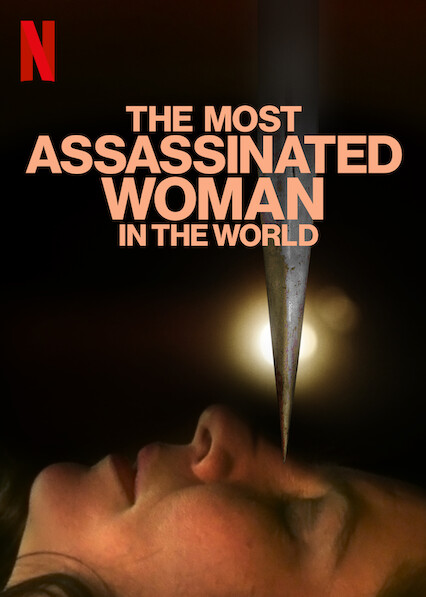
THE MOST ASSASSINATED WOMAN IN THE WORLD/ LA FEMME LA PLUS ASSASSINEE DU MONDE.
France, 2018, 102 minutes, Colour.
Anna Mouglalis, Neils Schneider, Jean-Michel Balthazar, Michelle Fau, Andre Wilms.
Directed by Franck Ribiere..
Certainly an arresting title!
And, it is soon explained, voice-over focusing on the theatre actress, Paula Maxa (1898-1970) who had made four silent films, horror films, in 1915-1916. However, she was celebrated as an actress in the Grand Guignol theatre, and a very long listing of the many ways in which she had been killed and died on stage.
The setting for this film is 1932, the time of popularity of the Grand Guignol but also demonstrations for its closure, protesters blaming a spate of violent serial killings on the influence of the performances at the theatre.
The focus of the story is on Paula, Anna Mouglalis, her domination by the manager of the theatre, not wanting to let her out of her contract, and his inventing ever more gruesome stories, no scruple, no moral in what he wants to present to make his theatre famous. And, the film shows the crowds coming to the theatre, an affluent audience, reacting in fear and horror, yet jumping to their feet to applaud at the end. The film shows one gruesome scenario to illustrate the style of performance at the theatre. And, another performance brings the story to a climax.
Paula is tormented by memories, seen in flashback, also the subject of the final theatrical piece, she and her sister attacked by an seeming friend, the sister killed, the attacker allegedly committing suicide.
Also in the film is an interesting character, Paul, the man behind-the-scenes who prepares all the special effects – and revealed that he has done a deal with the serial killer, receiving the bodies, draining their blood, experimenting for more effective concoctions for the performances.
The other main character is the journalist, Jean, Neils Schneider, who is investigating the theatre, the link with the actual murders in Paris, getting to know Paula, attracted, protective, writing his story, but also with a back story about a duel and the pursuit by the jealous husband.
The audience sees who the killer is and how he operates, his identity indicated, perhaps without the audience quite noticing, revealed at the beginning.
The film is very strong on atmosphere, especially of the theatre – and the raising of moral issues about violence, depictions of violence, influence, moral responsibility.
- The title and expectations?
- The traditional French theatre, Grand Guignol? Paris, the traditions, horror, live action, cruel plots, blood, the eager audience?
- 1932, Paris, costumes and decor, cars, theatre, cinema? The world of actors, behind-the-scenes, the affluent audiences and their response?
- Issues of horror, the actual murders, the opening, the murderous stalking the woman, fear, the sudden violence? Paula and flashbacks, her sister, the story of their parents, hoping to act, leaving, Jean, the seaside, the rapes, his alleged suicide? Serial killer, in 1932, outside the theatre, talking with Jean, his name, his deal with Paul, supplying the bodies, the flowers and the notes to Paula, the buildup to the climax, his seduction of Violette, her body, Paul and the final performance, actual blood, the audience reaction, Paula’s death? Jean, the aftermath, pursuing the young woman in the street, killing her?
- Issues of real-life serial killers and violence? Public sensitivities? The performances of the stories at the grand renewal? Violence, blame, responsibility?
- Andre, manager of the theatre, his ambitions, lack of scruple, driving Paula, owning her, refusal to let her go? As liaison with the doctor author? The doctor’s concern about Paula and her mental health, Andre driving her, his present at the theatre at the end and his concern?
- Paul, his skills, behind-the-scenes, his laboratory, the bodies, supplied by Jean, excising the blood, experiments, sugar, blends, tasting? As used in the performances? The comments by the performers about taste? And the blood on the audience, their bibs for the blood? The revelation of his dealings with the killer, the deal with Jean, the death sequence, Paul and switching the bodies, giving himself up, the tickets to America, ushering Paula into the car?
- The members of the cast, their performances, their attitudes, backstage?
- The performance, Paula, the preparations, her dressing room, on stage, the threats, eerie atmosphere, the blood, the aftermath, Paul removing the blood? And nightmares and their detail, the memories of the scene at the beach, her feeling of responsibility for her sister’s death? The re-enactment of the scene as the finale, characters, the sinister Jean, the killing?
- Jean, journalist, his interest, at the theatre, talking to Jean, watching the performance, the audience, preparing his article, discussions with his editor, the link with the serial killings? Going to the club, the singer, his memories of being there with his lover? The story of the duel, the wound, his being pursued by the masked men with the gun, his flight on the steps and bridge? His rival capturing him at the end? His relationship with Paul, the discussions are the night? His wanting to protect her? His appearing to her at the end?
- Dean and his praise of the cinema, inviting Paula, the going to see Dr No, the fan snipping Paula’s hair, the colour version?
- Jean completing his article, linking the murders and the performances, the publication of the article, his coming to the theatre, his being ousted, Paul waiting for him?
- The ending, Paul and his actions, Jean and his appearance, Paula sitting at the grave, Violette buried there, and her leaving?
- Actual events and characters, this imagination for 1932?